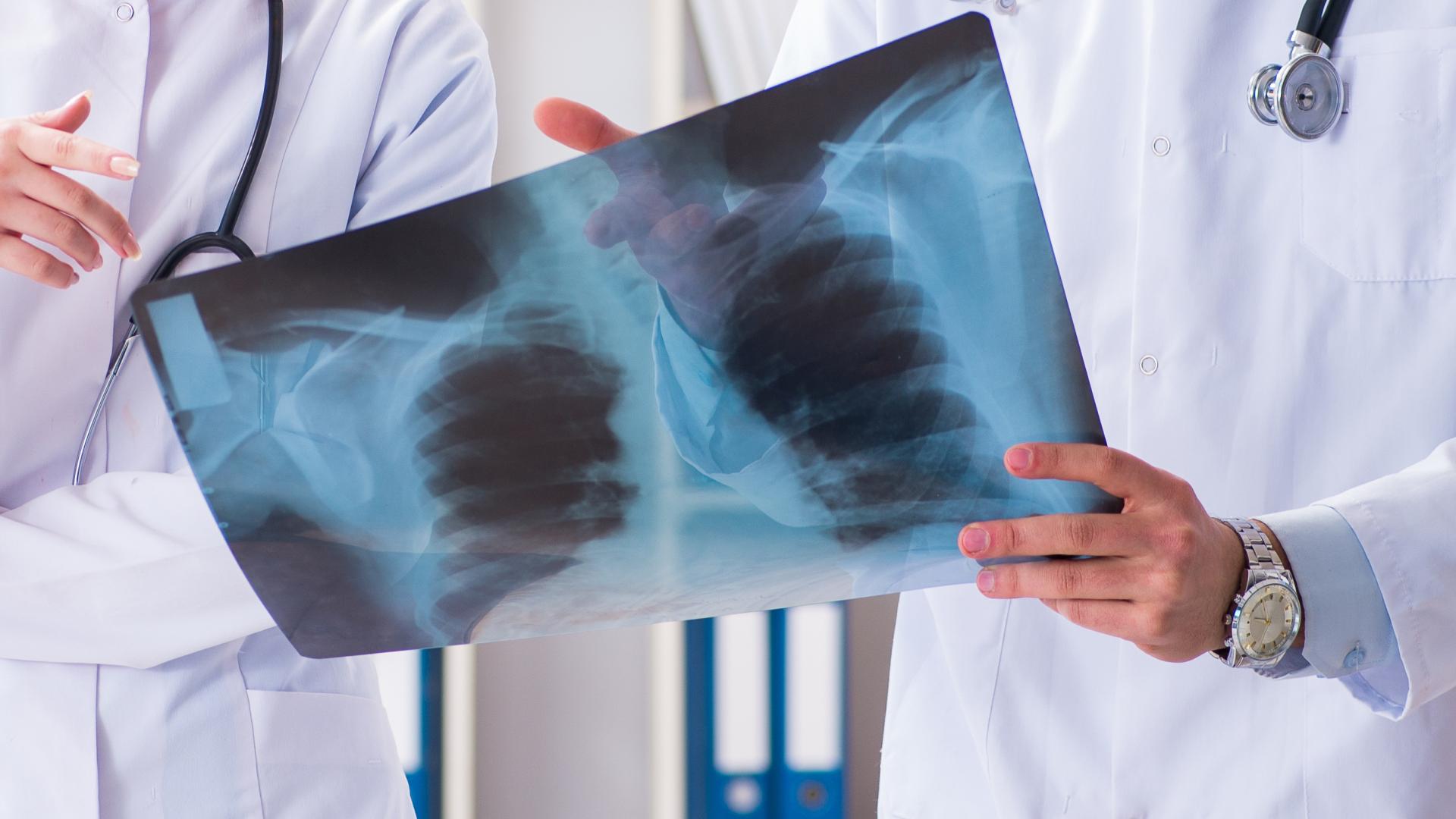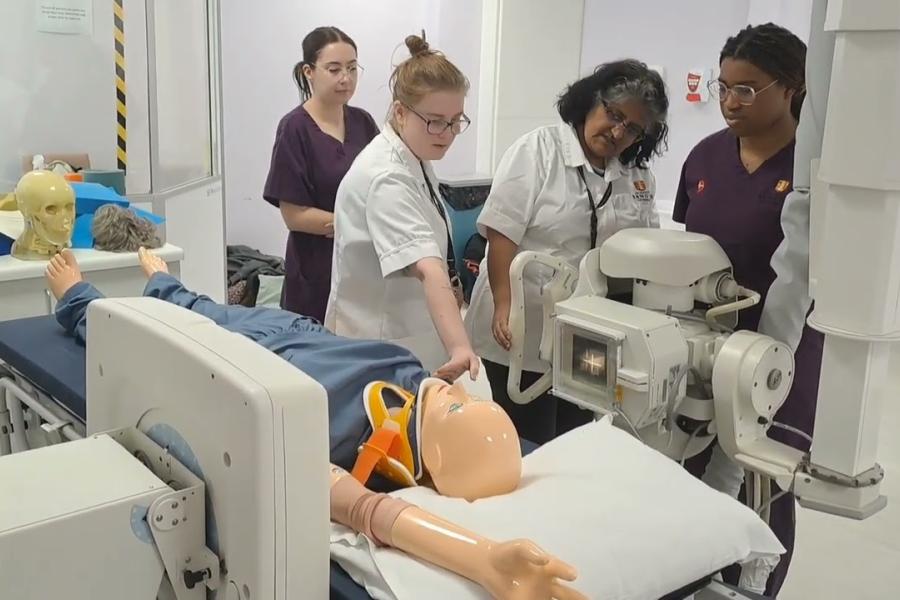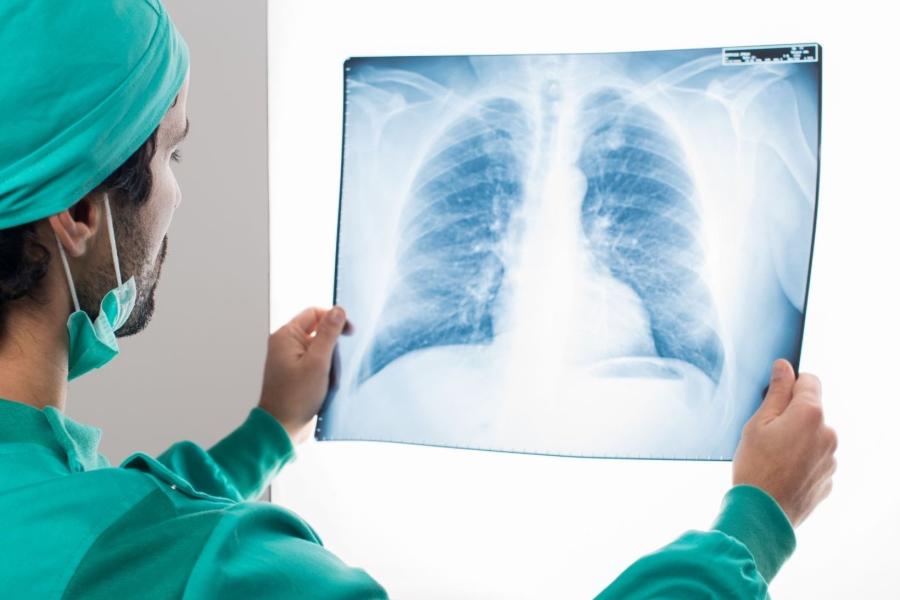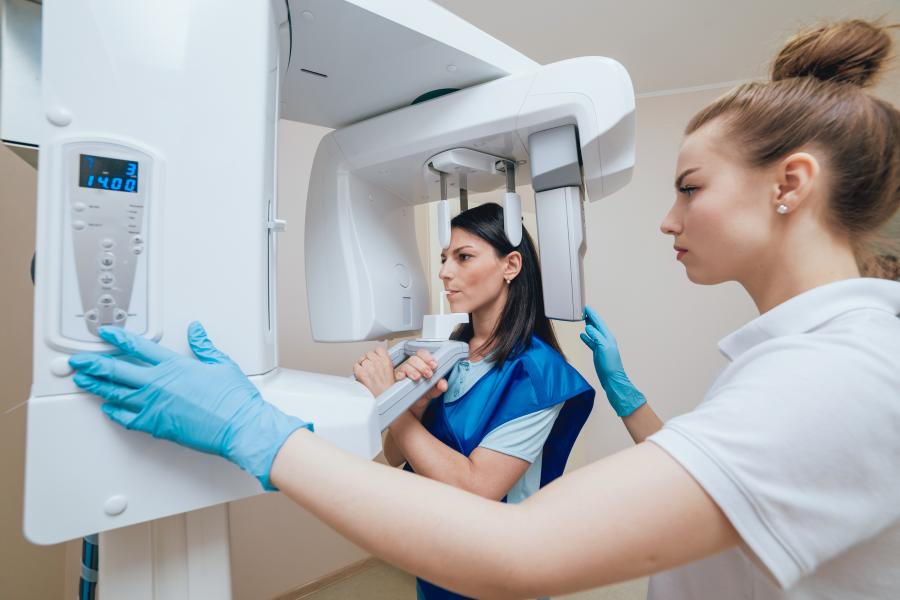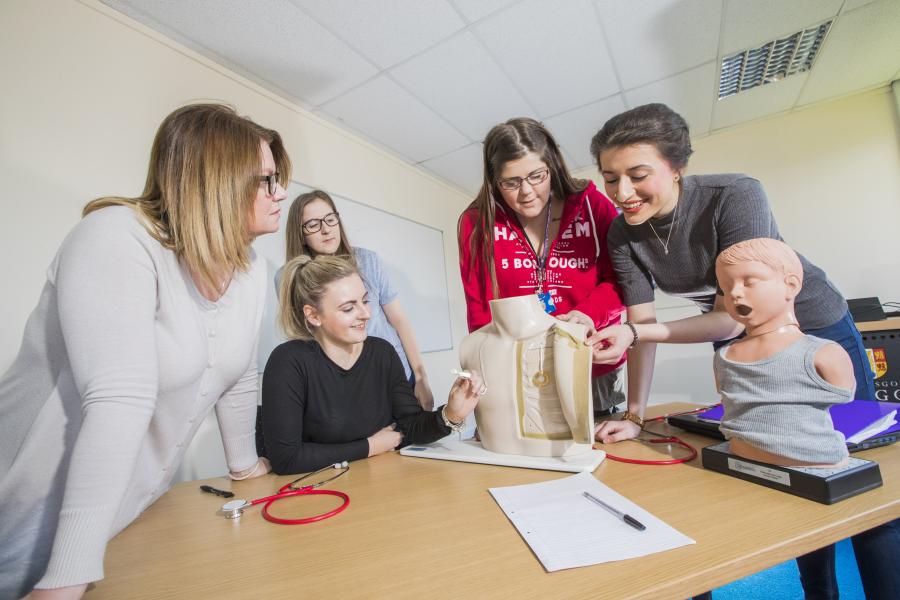About This Course
Diagnostic radiography is an invaluable aid in the diagnosis of disease. Diagnostic radiographers are responsible for the production of images involving the use of X-rays and other methods including ultrasound, computed tomography (CT), radionuclide imaging (RNI) and magnetic resonance imaging (MRI). You will learn not only about how x-rays are produced and the anatomy of the human body, but also how to talk to people and what sort of things patients/service users may be concerned about.
Radiography is one of the professions allied to medicine. Diagnostic radiography is an invaluable aid in the diagnosis of disease. As a diagnostic radiographer you’ll be responsible for the production of images involving the use of X-rays and other methods including ultrasound, computed tomography (CT), radionuclide imaging (RNI) and magnetic resonance imaging (MRI). Radiographers comment on image appearances for referrers after an examination is completed; they can also issue full reports after specialist postgraduate training. At postgraduate level they may develop their roles to include reporting on images, educating student radiographers, postgraduate training of radiographers or carrying out fluoroscopic, angiographic and endoscopic procedures. As a radiographer you’ll work in many areas in a hospital, in addition to the imaging department, including A&E, operating theatres and on hospital wards and the work placement settings on this degree will reflect that variety.
Bangor accepts applications for Diagnostic Radiography throughout the year, while places are still available. However early applications are strongly encouraged as radiography does usually fill all its places well before the end of the admissions cycle each year.
Tuition Fees Covered
If you are considered a home UK student for tuition fees who can commit to working in Wales for two years after graduating, you could get your tuition fees covered in full through the NHS Wales Bursary Scheme and claim for a £1,000 bursary contribution towards living costs. You can also apply for the means tested bursary that is dependent on household income and other funding that has eligibility criteria for child care support, dependents allowance and parental learner allowance. You can also apply for the income based maintenance funding and a reduced rate loan from Student Finance. As this course is funded by NHS Wales, we are unable to accept applications from overseas students.
Full details are available on our NHS funding page.
Location
The taught elements of this course are delivered at Bangor University’s Wrexham Campus next to Wrexham Maelor Hospital.
Interview and selection for Radiography
For information about the selection procedure for this course, please click on the Entry Requirements tab above.
Graduates of this course are eligible to apply for registration with the Health and Care Professions Council.
Why choose Bangor for this course?
- NHS funding currently available to cover fees and a contribution to living costs.
- Access to state-of-the-art technology including modern simulation equipment and the 1st immersive VR practical skills system in the UK.
Course Content
You’ll typically spend 37.5 hours a week on the course when on clinical placement (including study time) and approximately 20 hours when in academic study. You’ll be expected to complete assignments/ projects and some practical work in your own time and prepare for clinical assessments. Practical work is extremely important and experiments using equipment and phantoms (dummies and test tools) are a major feature. In the university you’ll have the opportunity to use simulation software, immersive virtual reality equipment as well as using the universities own digital x-ray suite which will help you gain the practical skills that will underpin your clinical placements.
Assessment includes written assignments, poster presentations, practical experiments, clinical assessments, oral presentations, problem-based learning and a research project.
The taught elements of this course are only delivered at Bangor University’s Wrexham campus next to Wrexham Maelor Hospital. Placements for Radiographers take place both within the BCUHB area in north Wales and in surrounding NHS trusts.
Modules for the current academic year
Module listings are for guide purposes only and are subject to change. Find out what our students are currently studying on the Diagnostic Radiography BSc (Hons) Modules page.
Course content is for guidance purposes only and may be subject to change.
Facilities
- Digital x-ray suite allows for a range of clinical skills to be taught to students in a simulated environment that helps to prepare you for clinical placements.
- Access to desktop simulation for projection radiography, CT, and radiographic physics which you’ll be able to access both on campus and via remote access to University computers.
- Immersive virtual reality equipment – Bangor is the 1st University in the country to have this software available to students which will enable you to safely examine virtual patients.
- Portable set.
Course Costs
General University Costs
Home (UK) students
- The cost of a full-time undergraduate course is £9,000 per year (2021/22 entry and 2022/23 entry).
- The fee for all placement, international, and sandwich years is £1,350 (2021/22 and 2022/23).
- More information on fees and finance for Home (UK) students.
International (including EU) students
Additional Costs
There are also some common additional costs that are likely to arise for students on all courses, for example:
- If you choose to study abroad or take the International Experience Year as part of your course.
- If you attend your Graduation Ceremony, there will be a cost for gown hire (£25-£75) and cost for additional guest tickets (c.£12 each).
Course-specific additional costs
Depending on the course you are studying, there may be additional course-specific costs that you will be required to meet. These fall into three categories:
- Mandatory Costs: these are related to a particular core or compulsory module that you’ll be required to complete to achieve your qualification e.g. compulsory field trips, uniforms for students on placement, DBS Check.
- Necessarily Incurred Costs: these may not be experienced by all students, and will vary depending on the course e.g. professional body membership, travel to placements, specialist software, personal safety equipment.
- Optional Costs: these depend on your choice of modules or activity and they are shown to give you an indication of the optional costs that may arise to make sure your choice is as informed as possible. These can include graduation events for your course, optional field trips, Welcome Week trips.
Entry Requirements
GCSEs: applicants must normally have, or be working towards, a minimum of five GCSE grades A*-C/9-4 including GCSE Welsh or English first language and Mathematics/Numeracy (or a recognised alternative qualification), but consideration is given to individual circumstances.
Please note: Recognised alternative qualifications for Welsh/English and/or Mathematics are Essential Skills Level Two in Communication and Application of Number, or Functional Skills Level Two in English and Maths (must be achieved within the last 3 years). The Irish Leaving Certificate minimum of O4 is the equivalent to GCSE Grade C/4.
Offers are tariff based, 120 tariff points from a Level 3 qualification* e.g.:
- A Levels: minimum BBC, including minimum grade B in Biology or grade B in Physics. General Studies and Key Skills not accepted.
- BTEC National Extended Diploma: DDM in a Health or Science Subject
- Cambridge Technical Extended Diploma: Minimum DDM in a Health or Science Subject
- Access: Science based pathway
- International Baccalaureate Diploma: Pass required, including H6 in Biology or Physics
- Extended Project Qualification (Points can include a relevant Extended Project (EPQ) but must include a minimum 2 full A-levels, or equivalent)
- T Levels: relevant subjects will be considered on a case by case basis.
- Welsh Baccalaureate
- Irish Leaving Certificate: Minimum of 5 Higher Subjects at grade H3 (Including Biology or Physics)
We welcome applications from mature students who are completing an Access HE Diploma or who have evidence of recent study at Level 3* or above in the past five years which meets our entry requirements.
Please note that we do not accept NVQ Level 3/QCF Level 3 as a means of meeting our entry qualifications. We are happy to accept combinations of the qualifications listed above, as well as alternative Level 3 qualifications such as City & Guilds, Access and Cambridge Technical Diplomas.
*For full details go to our website and for a full list of accepted Level 3 qualifications, go to www.ucas.com.
Additional Information: The School requires all candidates to undertake a criminal record check and other requirements for demonstrating good character; the local Health Board will be responsible for setting the requirement for good health. The criminal records check will include an enhanced DBS check for the child and adult workforce including a check of the barred lists. Applicants who have lived or worked outside the UK are also required to undertake a criminal records check in their countries of residence. For further information and advice please contact the School at
Interview and selection for Radiography
All shortlisted applicants will be required to attend a group interview and attend an X Ray department in a hospital for the equivalent of 2 full days before March 15th. After the interview candidates will be notified via UCAS so please do keep a close eye on your UCAS account. Please visit the interview and selection page for Radiography to find out more.
Interview Dates
- 15th January
- 16th January
- 18th January
- 19th January
- 22nd January
- 23rd January
- 25th January
- 26th January
- 7th February
- 12th February
- 13th February
- 15th February
- 16th February
- 21st February
- 13th March
- 17th April
Unfortunately as this course is funded by the NHS and students have to have placements in the local NHS Health Board we are unable to accept applications from international students.
General University Requirements
To study for a degree, you’ll be asked for a minimum of UCAS Tariff points. For a fuller explanation of the UCAS Tariff Points, please see www.ucas.com.
We accept students with a wide range of qualifications and backgrounds and consider each application individually.
All students need to have good basic skills and the University also values IT and communication skills.
As part of the University’s policy, we consider applications from prospective disabled students on the same grounds as all other students.
We also consider applications from mature students who can demonstrate the motivation and commitment to study a university programme. Each year we enrol a significant number of mature students. For more information about studying as a mature student, see our Studying at Bangor section of the website.
EU and International Students' Entry Requirements
For detailed guidance on the entry requirements for EU and International Students, including the minimum English Language entry requirement, please visit the Entry Requirements by Country pages. International applicants can also visit the International Education Centre section of our website for further details.
Bangor University offers International Incorporated Bachelor Degrees for International students whose High School qualification is not equivalent to the UK school leaving qualification. The first year (or Year 0) is studied at Bangor University International College, an embedded College on our University campus and delivered by Oxford International Education Group.
Careers
Career prospects in Diagnostic Radiography continue to be excellent for Bangor graduates. For over a decade our graduates have found 100% employment within 3 months of graduation, mainly within the NHS. Career development is linked to continuous professional development with the opportunity to achieve postgraduate qualifications. Once qualified it is possible to specialise in a particular imaging modality or further develop your career within Radiography as an advanced or consultant practitioner.
Opportunities at Bangor
The University’s Careers and Employability Service provides a wide range of resources to help you achieve your graduate ambitions.
The Bangor Employability Award (BEA)
The BEA is a comprehensive online course that you can work through at your own pace, taking you through all the steps you need to take to explore, prepare and apply for your dream career.
Internships
Bangor University runs a paid internship scheme within the university’s academic and service departments.
Student Volunteering
Volunteering widens your experience and improves your employability. Find out more about volunteering on the Students’ Union’s website.

